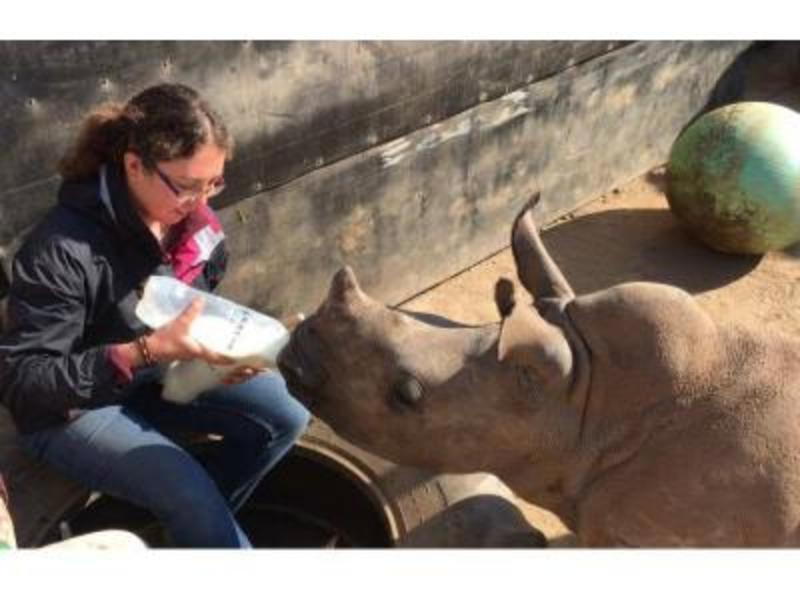Registered Veterinary Nurse, Emma Ruggles spent 2 weeks volunteering at a Rhino Orphanage and Rehabilitation Centre in South Africa ‘Care For Wild Africa’ - a centre that specialises in the care, rehabilitation and release of injured/orphaned white and black rhino calves that have sadly all lost their mothers due to the poaching crisis. Emma had an amazing time and shares some of her pictures and experiences with us.
My reasons for an African Experience
My reasons for an African Experience
I found this project through the company ‘African Conservation Experience’ who I travelled with. I’ve always had a real love for both elephants and rhinos but rhino are my favourite animal so when I saw the opportunity to visit a rhino rehabilitation project I couldn’t say no! I also wanted to actively contribute to the cause and do my bit to help these animals that are currently a species in crisis and facing extinction as a result of poaching and illegal trade in rhino horn, they are being poached and their horns sold on the black market to countries like China and Vietnam for use in medicines and as status symbols.
The Aims of the Project
Even though rhino horn is made of keratin, the same substance as human hair and finger nails and has NO medicinal value whatsoever, it is an incredibly sad situation. ‘Rescue, Rehabilitate, Release’ ‘Care for Wilds vision is to secure free-ranging African Rhinoceros in protected sanctuaries across Africa, to ensure the survival of the species for future generations. Baby rhinos that are orphaned in the wild rarely survive.
The mission of Care for Wild Rhino Sanctuary is to rescue every rhino that is orphaned, to heal them and to provide a totally secure environment where they can grow, roam free, and breed to ensure that there will always be rhinos in Africa.
Sanctuary Founder
The Care for Wild Rhino Sanctuary NPC was founded by Petronel Nieuwoudt 15 years ago in the Limpopo province, with the goal of providing care and rehabilitation to a wide range of animals. Including 2 resident hippos named Emma and Molly that were rescued after being found wandering alone as calves and 2 Lions Tuscan and Figa that were confiscated and rehomed at the center after being kept as illegal pets. Despite intense counter poaching efforts, rhinos continue to be poached at unprecedented levels throughout South Africa.
Safety and Security
Care for Wild Rhino Sanctuary NPC is developing a concise strategy to ensure the safety and security of the rhinos under the centres care, and is committed to maintaining the highest level of protection. Such security measures will include (but are not limited to) 24/7 monitoring of individual animal groups, highly trained armed game scouts, mobile response units, communications network, crime intelligence, intense surveillance and live video monitoring, trained counter poaching dogs and their respective handlers, watch towers, electrified fencing, and aerial support’. (Ref. Care For Wild, 2017).
Rearing Orphan Rhinos
Poaching is rife in South Africa, a rhino calf will stay with its mother until it’s up to 4 years of age and the youngest orphan at the centre was just 4 weeks old. She had been recently rescued after her mother and older sibling were poached. The youngest calf was having bottles of milk every 2 hours around the clock and the 18 month old calves had a bottle first thing in the morning and last thing in the evening.
Memorable Moments
Two of my most memorable moments from my trip would have to be, making up the feeds every morning and evening and bottle feeding the rhino calves, especially little Khanya and Rose two of the youngest residents (you can see me feeding Khanya in one of the pictures!) and a group of us spent a day out at Kruger park on Safari during my stay and we saw the big 5 - Lion, Rhino, Buffalo, Elephant and Leopard - as well as two male cheetah all out in the wild where they belong.
Something I will never forget.
Reflecting On My Trip
Travelling to South Africa and being a part of the amazing work at this centre and helping the amazing dedicated team of people that have committed their lives to rehabilitating African wildlife was one of the most incredible experiences of my life and one that I will never forget, it was hard work (A lot of rhinos means a lot of rhino poo needs to be shovelled!) but worth it to be able to work up close and personal with these beautiful, sensitive little Rhinos (that all also have their own quirky personalities much like our dogs and cats) as well as all the other wildlife being cared for at the sanctuary. I made some great new friends during my time there who I hope to stay in touch with (including two other fellow veterinary nurses from other parts of the UK) and I look forward to heading back to 'Care For Wild' or even another wildlife project in Africa to work with the wildlife again in the future.

